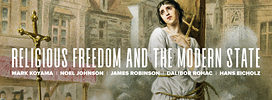I thank Mark Koyama and Noel D. Johnson for their clarifications, and I think that we are not so far apart.
A couple of issues though could still be developed further: What is a state’s “capacity,” and what is its relationship to general rules?
The reason I took their theory of history to be stadial was due to the degree of emphasis they placed on the transitions from personal to identity to general rules. This emphasis seemed to be doing the heavy lifting in the definition of a strong versus a weak state, and also to be rendering the principal framework of their historical process.
If “capacity” is defined as a power to effect some desired change, then it is not clear why a state that is serving rules of identity, if it is in fact effectively preserving such, is not displaying “capacity.” It must rather be that they mean that the state is displaying a capacity of a particular sort.
Is capacity simply in the marshaling of resources? But every state calls upon resources, and if those resources are sufficient to the ends sought, then again, it begs the question of what it means to speak of capacity outside of specific purposes. If we accept that competition of various sorts, among various types of polities and institutions, drove the development of modern states to embrace a general rule approach to certain aspects of their domestic policy, it won’t help simply to define it as such. Rather, we ought to probe more deeply into why they did that.
And our authors have in fact done this, noting that fiscal policy was driven by the needs of war, or as they stated in their response to me, to “gain advantage over their rivals.” Thus Prussia worries about what France is doing, and it becomes more effective policy for Prussia to stop engaging in domestic persecution so as to gain access to the resources (i.e. men and money) to repel rival states. So capacity is capacity for war, and the competition for such is what drove “statesmen” to seek ways of unlocking the coffers of all their inhabitants. Where did they get the idea then for a general truce among the adherents of different faiths within their territories?
Freeing commercial relations, improving currency, regularizing rules of finance and banking by states were also products of long and arduous processes for very much the same purposes that entailed the application of general rules. The general rules that are particular to modern commerce, however, grew up initially in the interstices of all these various powers. Merchants were able to form quite extensive networks simply by observing certain rules of property and contract, while obtaining sufficient compliance through a hodgepodge of custom, reputation, and piecemeal enforcement by sometimes this lord over here, and sometimes that lord over there. And the various potentates noted the fortunes being so accumulated from the late Middle Ages onward. Again, the Hanseatic league cities are key to understanding the processes involved at their earliest and most basic level.
I would even venture to say, that it was here, among the cities, that we find the very source of the idea that treating all men equally with regard to certain objects was first realized, the old notion that one is set free by breathing the air of the city. In this instance, the advantages of regular and equal enforcement of the rules of property provided an analogy for so treating individuals with regard to other aspects of their persons, including their religious beliefs. And this certainly can be seen in the case of the League of the Rhine when the cities of “Mainz, Cologne, Worms, Speyer, Strasbourg, Basel and other cities” sought to assure the peace by uniting for defense and observing that “This promise shall be kept in such a way that not only the greater ones among us shall have the advantage of this common protection, but all, the small with the great, the secular clergy, monks of every order, laymen, and Jews shall enjoy this protection and live in the tranquility of holy peace.” It was a beginning, and it was 1254.
Why didn’t all decentralized areas of the world move along these same lines? Different ideas, different degrees of urgency, and even serendipity all played their parts. And it is not that competition was not having an effect elsewhere. I see that our authors cite an essay by Roland Vaubel, but not the collection he edited with Peter Bernholz, Political Competition, Innovation and Growth in the History of Asian Civilizations (2004). Sometimes competition did play an important role in other parts of the world, but then other factors would intervene. It is almost never just linear causality in history.
So, I would simply encourage them to highlight further the issue of competition, and in conjunction with Dalibor Rohac, would emphasize that federalism as well as separation of powers all express varieties of rivalrous institutional forms within polities that help explain why certain types of rules are maintained despite the ease with which identity groups can form.

